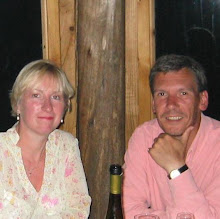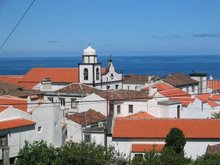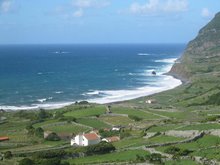Yesterday, I was asking Fernando when a certain event had taken place and he told me it was on "dia do balde amarelho". I understood what he meant immediately: Wednesday, the day when the yellow recycling buckets are collected.
Naming days of the week after the colour of the bucket collected is far easier for us English speakers, with our penchant for Roman and Anglo-Saxon deities, to understand than the Portuguese convention which is:-
Monday - segunda feira
Tuesday - terca feira
Wednesday - quarta feira
Thursday - quinta feira
Friday - sexta feira
Saturday and Sunday are easy enough (sabado and domingo) but which idiot decided that Monday was the second day of the week? (Answer own question - a Seventh Day Adventist, obviously). After nine years of living here (yes!), I have just got my head round the fact that Monday is segunda and that Friday is sexta. I'm half way to accepting that terca is Tuesday (which is also helpfully dia do balde verde (bottles)) but I still have to count my fingers to remind myself what Wednesday and Thursday are - and remember not to count the first finger. This is not recommended when driving.
Hence, Wednesday being yellow bucket day instead of fourth (yes?) is immensely helpful although this alternative recycling nomenclature does have its limitations in that the fifth bucket (paper) is only emptied every second blue. I don't have enough fingers for that.
Getting your head round that is in a different league from possessive adjectives (his/her) being gendered according to the object rather than the subject. And this apparent lack of spatial dynamic is odd coming from the people who (a) discovered Brazil; and (b) perhaps because of (a) not only have two parallel versions of here and there (aqui/ali and ca/la) but also a third dimension in which ai is "there" but in the sense of "where you are" whether that be in the same room as me or in a different continent.
But I still think all of this pales into insignificance next to the mental gymnastics involved in saying "See you on Wednesday". Until I discovered you can say Ate amarelho!







2 comments:
"Days of the Week in Portuguese - Origin of the Names":
http://gobrazil.about.com/od/travelportuguese/qt/daynames.htm
I've read other experts contend that because "sábado" refers to the Jewish sabbath on Saturday, it's evidence of long-ago Jewish influence on Portugal and the Portuguese language. However, solving that etymological puzzle is above my pay-grade!
Aqui/cá - ali - lá are the equivalent of hither - thither - yon (i.e., "ali" is at middle distance).
The business of possessive adjectives modifying their nouns rather than the gender of their reference requires much use of context, and can try a translator's patience. It's a treat when someone uses the unambiguous "dele(s)" or "dela(s)" instead.
Please say "Olá" to Fernando for us. How are his cats doing? And his chickens?
This might help: http://www.ciberduvidas.com/pergunta.php?id=4119
Post a Comment